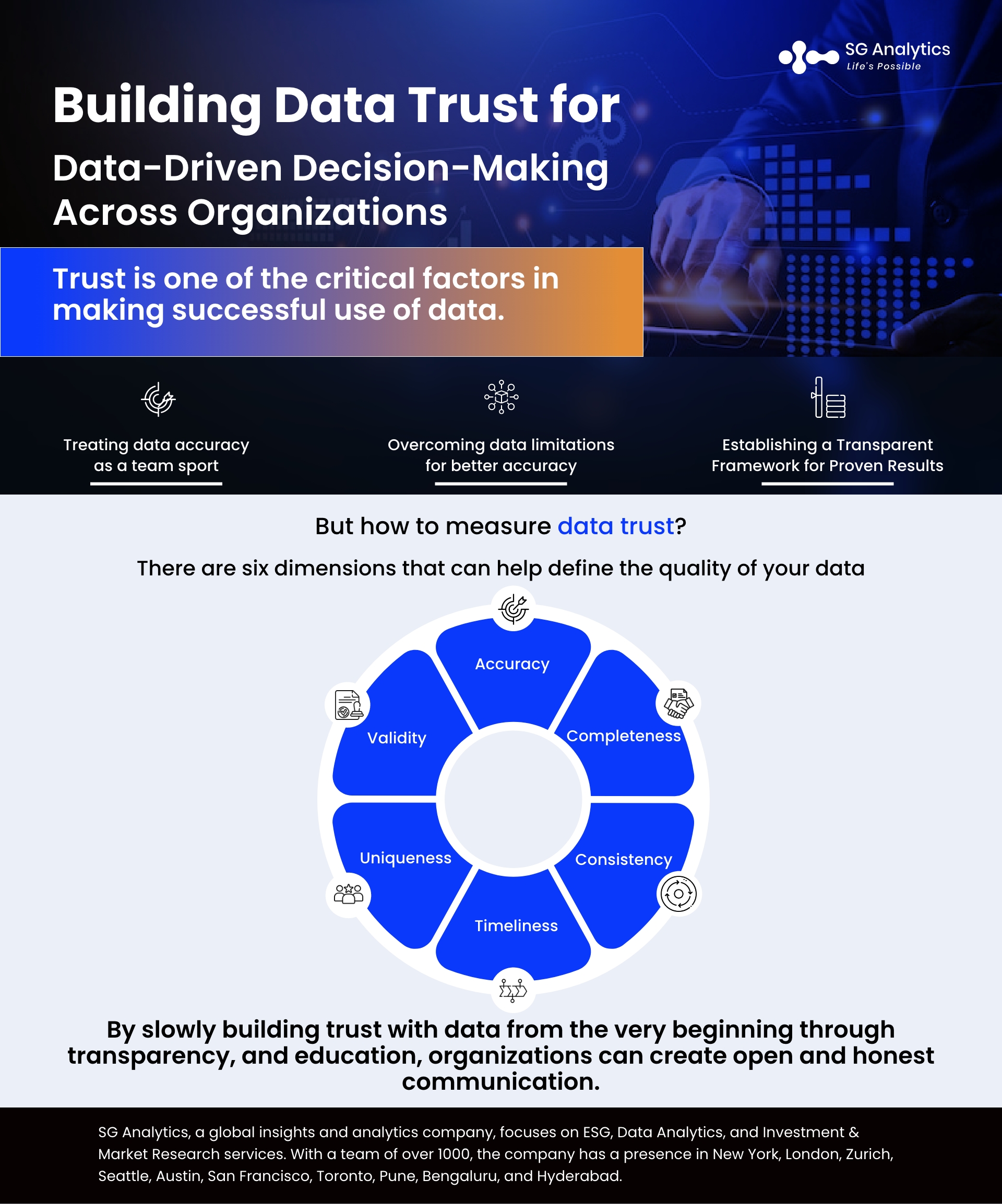Today data is becoming an integral part of a company’s operations. And trust in data is becoming an increasingly fraught issue, especially while gathering more information.
-
The first step in building trust in data is ensuring that the data supply chain is aware of the critical role data plays in every operation.
-
The second step is to focus on accuracy and eliminate the restrictions on the volume of data required for accuracy and performance needed for actions.
-
The third step involves building trust to ensure that all analytics and actions that are taken can be replicated and proven.
The power of a data-driven world is likely to outweigh the risks and encourage trust in the technology that makes innovation possible. For organizations to walk the walk on data, they should start trusting their analytics, promoting the kind of data-focused operation that every business needs.
Trust in data is emerging as an increasingly fraught issue across organizations as they gather more information. While many still prefer trusting their gut to rely on data, it makes it harder for enterprises to derive much benefit from their analytics. Manual data quality management cannot help an organization to scale to those volumes. The accumulated data passes through a series of complex information systems coded by multiple developers. This further raises the risk of code-introducing errors.

Read more: How to Leverage Purpose-driven Data to Accelerate Business Growth?
But what exactly does it mean to trust in the data?
Data trust implies having confidence that the accumulated organizational data is healthy and ready to act on. Trust is one of the critical factors in making successful use of data. Combined with culture and agility, it guides organizations to achieve data health. And by ensuring trust in data across departments, organizations can equip their teams with the ability to improve operations, design exceptional consumer experiences, streamline decision-making, and drive innovation. However, data trust must be earned and quantified. And before trusting an organization’s data, it is important to prove that the data is capable of producing reliable analytics and supporting well-informed business decisions.
Building Data Trust
Today, the buzz is all about data-driven decision-making, as experiences from the past are no longer the driving factor for the future. And in many organizations, this is proving to be difficult.
Many organizations are facing reluctance from their executives as well as employees to make a move from experience-driven decision-making to data-driven decision-making. They are afraid that this pivotal transition can undermine their value. However, this reluctance is based on much more foundational, i.e., trust.

Every employee in an organization is accountable for their decisions. However the data being used for decision-making is to blame if there is a negative customer experience or a damaged reputation. With organizations evolving toward artificial intelligence (AI) in the form of machine learning-powered models, they are able to operate in real-time and take automated, proactive actions. And data lies at the very core of this. Due to this reason, building trust in data is where the focus should be.
Read more: Data as a Strategic Asset: How are Businesses Embracing the Mindset
Step 1: Treating Data Accuracy as a Team Sport
The first step in building trust within an organization is ensuring that everyone in the data supply chain identifies the critical role that data plays. This is relatively straightforward when considering clickstream data, log data and other digitally generated data. However, many CRM systems and other platforms that require employees to enter data are often dismissed as corporate checkboxes despite their critical role in key business decisions.
Incentivizing the people who enter the data to enter it accurately and completely rather than threatening or punishing those who do not is an important first step. They end up issuing reports that highlight whether the data is inaccurate or incomplete.
Step 2: Overcoming Data Limitations for Better Accuracy
The second step implies building a focus on accuracy. Individuality, as well as personalization, are more critical than ever for data across industries like healthcare, tech, retail, or finance. This suggests the need to eliminate restrictions on the volume of data required for accuracy and performance to take proactive actions. Many organizations are building innovative ML-powered projects by using specialty platforms, but they only have a sample or subset of relevant data. And for many, it is due to the limitations of the platform used. Too much data can often lead to significant delays in outcomes, thereby negatively impacting the ability to take proactive actions.

Organizations today should not limit their fundamental commitment to accurate and actionable outcomes. By selecting a platform that can handle the performance and scale, they can work towards building data trust.
Step 3: Establishing a Transparent Framework for Proven Results
The third step in building data trust is to ensure that all ML-powered analytics and the actions taken can be replicated and proven. Machine learning is considered a black box, and this often ends up becoming the foundation of distrust and fear in data-driven outcomes. Furthermore, the risk of negative customer feedback and publicity leads to further nightmares for many.
The majority of the first steps in building trust in ML are entirely dependent on selecting the right technology. This helps in fostering a customer experience that is intuitive, minimizes cumbersome employee data entry work, and offers a platform that can unify data siloes. And this ability of data to replicate, demonstrate, and articulate decisions is considered a core requirement of ML-powered decision-making.
Read more: Employing Data and Analytics to Drive a Strong Marketing Strategy
Data Duality Dimensions
But how to measure data trust? There are six dimensions that can help define the quality of your data:
-
Accuracy: The degree to which data can be used to describe a real-world object or event.
-
Completeness: The proportion of data stored.

-
Consistency: The absence of difference when comparing two or more representations.
-
Timeliness: The degree which represents that the current data is enough to support business functions.
-
Uniqueness: No item or entity is recorded more than once.
-
Validity: The degree to which data conforms to the format, type, or range.
The more highly the data across each of these dimensions is rated, the more it can be trusted.
Establishing a Data Trust Framework
To achieve data trust in a world of so much data, organizations need to implement and automate processes for assessing, auditing, and cleaning the existing as well as new data. But data trust cannot be accomplished through technology alone. Complete data trust solutions are required to establish a data infrastructure with human processes and software. It is also necessary to establish a data-centric culture that works in association with data quality automation.

Infrastructure for data health will help in leveraging the knowledge of line-of-business stakeholders. Artificial intelligence tools will further equip data engineers to perform complex operations without the need for coding. With the right solution, organizations can make it easier for everyone to understand data, work with it, and establish trust.
Read more: Data-Driven Influencer Marketing Campaign: The New Strategy for Growth
Final Thought
The stories that we need to share are about the impact on safety, security, health, and the environment. The power of analyzing data in time implies more about potentially optimizing project insights and restricting malware before it corrupts the systems. The power of a data-driven world will likely outweigh the risks and encourage organizations to take it seriously.
Building trust between stakeholders and data is like cultivating and building trust in any relationship. To overcome the innate resistance to change that is data-driven, organizations need to inspire their employees and customers with stories that portray the positive improvements as much greater than the risk. Inspiration does not improve profitability, reduce customer churn, or optimize supply chains.

By slowly building trust with data from the very beginning through transparency, and education, organizations can create open and honest communication.
With a presence in New York, San Francisco, Austin, Seattle, Toronto, London, Zurich, Pune, Bengaluru, and Hyderabad, SG Analytics, a pioneer in Research and Analytics, offers tailor-made services to enterprises worldwide.
A leader in Data Analytics, SG Analytics focuses on leveraging data management and analytics, and data science to help businesses discover new insights and build strategies for business growth. Contact us today if you are looking to make critical data-driven decisions to prompt accelerated growth and breakthrough performance.









